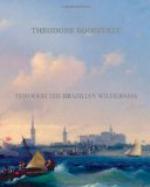At noon on the twelfth we were at the Brazilian boundary. On this day we here and there came on low, conical hills close to the river. In places the palm groves broke through the belts of deciduous trees and stretched for a mile or so right along the river’s bank. At times we passed cattle on the banks or sand-bars, followed by their herders; or a handsome ranch-house, under a cluster of shady trees, some bearing a wealth of red and some a wealth of yellow blossoms; or we saw a horse-corral among the trees close to the brink, with the horses in it and a barefooted man in shirt and trousers leaning against the fence; or a herd of cattle among the palms; or a big tannery or factory or a little native hamlet came in sight. We stopped at one tannery. The owner was a Spaniard, the manager an “Oriental,” as he called himself, a Uruguayan, of German parentage. The peons, or workers, who lived in a long line of wooden cabins back of the main building, were mostly Paraguayans, with a few Brazilians, and a dozen German and Argentine foremen. There were also some wild Indians, who were camped in the usual squalid fashion of Indians who are hangers-on round the white man but have not yet adopted his ways. Most of the men were at work cutting wood for the tannery. The women and children were in camp. Some individuals of both sexes were naked to the waist. One little girl had a young ostrich as a pet.
Water-fowl were plentiful. We saw large flocks of wild muscovy ducks. Our tame birds come from this wild species and its absurd misnaming dates back to the period when the turkey and guinea-pig were misnamed in similar fashion—our European forefathers taking a large and hazy view of geography, and including Turkey, Guinea, India, and Muscovy as places which, in their capacity of being outlandish, could be comprehensively used as including America. The muscovy ducks were very good eating. Darters and cormorants swarmed. They waddled on the sand-bars in big flocks and crowded the trees by the water’s edge. Beautiful snow-white egrets also lit in the trees, often well back from the river. A full-foliaged tree of vivid green, its round surface crowded with these birds, as if it had suddenly blossomed with huge white flowers, is a sight worth seeing. Here and there on the sand-bars we saw huge jabiru storks, and once a flock of white wood-ibis among the trees on the bank.
On the Brazilian boundary we met a shallow river steamer carrying Colonel Candido Mariano da Silva Rondon and several other Brazilian members of the expedition. Colonel Rondon immediately showed that he was all, and more than all, that could be desired. It was evident that he knew his business thoroughly, and it was equally evident that he would be a pleasant companion. He was a classmate of Mr. Lauro Muller at the Brazilian Military Academy. He is of almost pure Indian blood, and is a Positivist—the Positivists are a really strong body in Brazil, as




